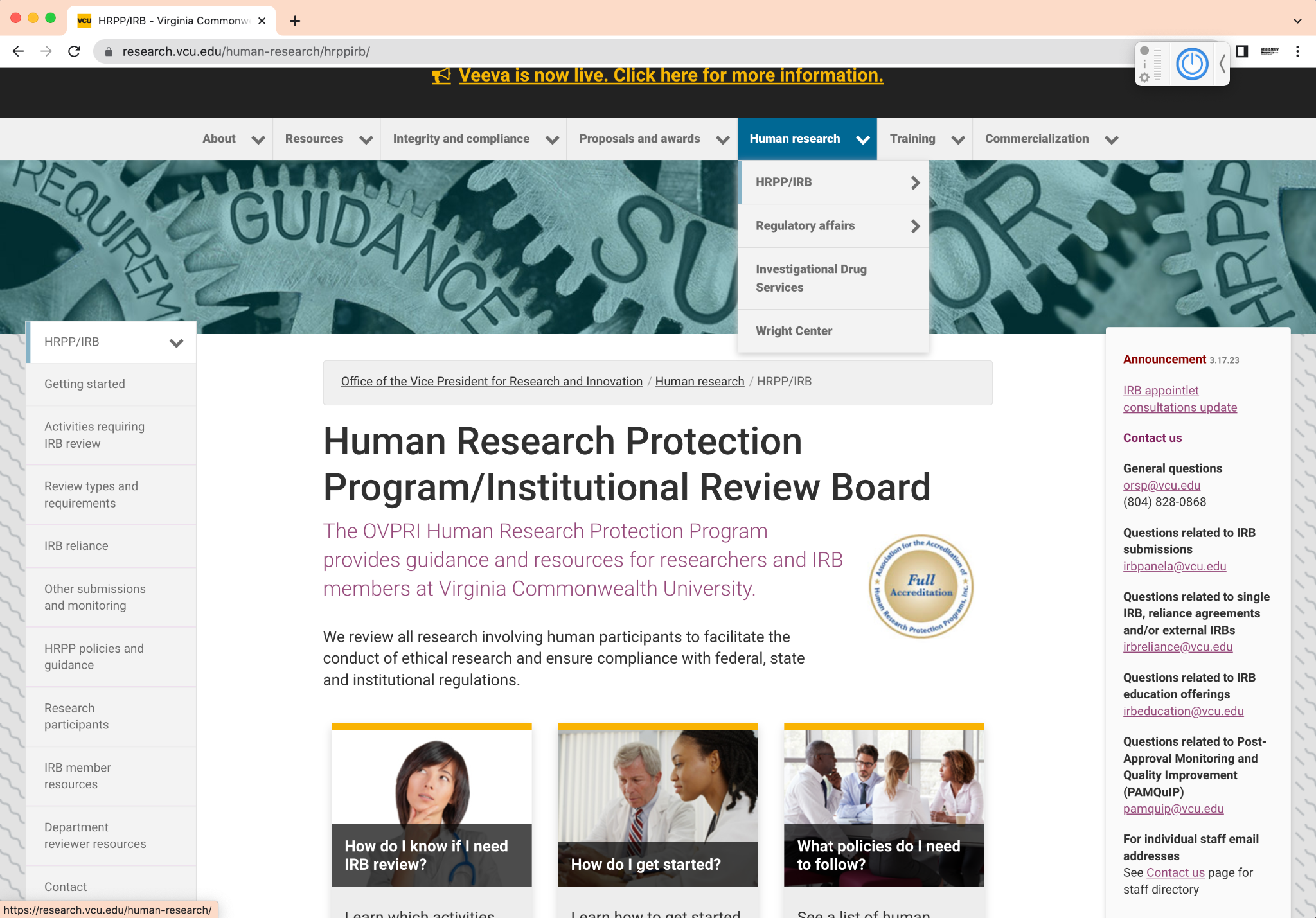8. Ethics
8.3. Regulating Research: Institutional Review Boards and Professional Norms
Learning Objectives
- Describe the purpose of institutional review boards and provide examples of the ways they provide oversight over scientific work.
- Discuss how professional ethical norms influence the conduct of research.
Now that you are familiar with some of the ethical principles and standards that sociologists need to follow in conducting sound research, let’s talk in greater detail about the institutional bodies that help devise and enforce these norms and rules. In the United States and other countries, universities and other institutions that want to apply for government funding to support their research projects must establish that they have complied with laws governing the rights and protection of human subjects. At universities, this compliance process is overseen by a panel of experts—called an institutional review board (IRB) in the United States and an ethics committee in the United Kingdom.
Seeking approval from IRBs to conduct research is standard practice across scientific communities. Technically, IRBs are only required for institutions that use federal funds, but nowadays, they exist at virtually all scholarly organizations that conduct research. Their purpose is to evaluate the ethics of the studies that the organization’s researchers conduct. Especially if their proposed study involves human subjects, researchers must submit an application to the IRB that details their study’s design and procedures. The IRB reviews these applications to ensure that the researchers adhere to the principles we described earlier of no harm to participants, informed consent, and protection of identities.

Even though IRBs were originally created to comply with federal laws regulating federally funded projects, they typically vet all research involving human subjects being conducted at a particular institution—including studies not funded by grants, as well as student projects. In fact, the same standards and procedures normally apply to student-conducted research as well, which means that if you are surveying, interviewing, or observing human subjects for a class paper or student thesis, you may be required to go through the process of IRB review. You should check with your institution if that is indeed the case. Studies that are not considered “research on human subjects”—say, a statistical analysis of an existing, publicly available dataset, or a content analysis of published news articles—may be designated as exempt from IRB review, which means they can proceed without the review board’s approval; the specific procedure depends on the institution, and you should always check what the relevant rules are.
The IRB approval process requires completing an extensive application that covers how the research will be conducted and how the rights and well-being of any human subjects will be protected. In addition, the researchers typically must submit drafts of any consent forms, survey questionnaires, and interview guides they are using. They must take a research ethics course or refresher (nowadays, usually in the form of self-paced online modules) to certify that they are familiar with the principles of ethical research we have covered in this chapter. And they must identify all the research personnel involved with the study, including the key researchers (called principal investigators, or PIs) and any assisting researchers (co-PIs or co-investigators), sometimes also providing credentials for them.
Data collection can commence only after the IRB clears the project. In vetting each application, the IRB’s reviewers will suggest changes to the study design to minimize any risks posed to human subjects, ensure informed consent, and protect the privacy of participants. The nature of their evaluation can run the gamut from outright rejection of a problematic research design to minor feedback on the wording of consent forms, interview guides, and survey instruments. At some institutions, researchers frequently revise their IRB applications multiple times, continually adjusting their study procedures until the review board is fully satisfied and greenlights the project.
While IRB review is very widely implemented at U.S. universities, hospitals, and even think tanks, some researchers criticize it as too bureaucratic and burdensome. Depending on the institution and the complexity of the proposed study, IRB review may take weeks or months, which can be a problem when a study is time-sensitive. And the nature of the review process effectively discourages certain types of research, critics say—specifically, more experimental, critical, and open-ended studies. For qualitative studies that use an inductive logic, it may not be possible to disclose a lot of information to participants beforehand, as the study itself may change over the course of the fieldwork—especially when researchers are asking open-ended questions of their respondents and refocusing their study to address any surprising answers they hear.
Some scholars argue that IRBs need to strike a better balance between protecting human subjects and encouraging important research to proceed (Kotsis and Chung 2014). As the review system stands now, they say, its desire to limit liability, implement stringent rules, and standardize practices across very different types of research places unnecessary hurdles in the way of researchers. This is especially the case for those who study controversial or sensitive topics, whose work is apt to be slowed down or stifled because a bureaucracy whose core mission is to reduce risks cannot help but be allergic to such research. Likewise, scholars who employ methods that gather heaps of identifying data (again, qualitative approaches tend to fall in this camp) are more likely to run afoul of the IRB’s mandate. The end result of these institutional incentives is a severe constriction of the freedom and creativity of researchers. Some critics go so far as to claim that IRBs are dysfunctional organizations by their very nature, structured in a way that discourages transparency and accountability. And when it comes to the social sciences—where the potential risks to human subjects tend to be substantially lower than for biomedical studies—the powers that IRBs have to regulate this research are way out of step with the actual need to intervene, critics say, meaning that IRBs have become de facto “censors” of social science research (Schneider 2015).
Nevertheless, the long history of scientific misconduct we’ve described in detail throughout this chapter should remind you how the regulation of research is essential—left to their own devices, scientists continually prioritize advances in their research over the well-being of their research participants. We suggest that you approach IRB reviewers not as antagonists, but also collaborators in your research. They are trying to do their job—protect human subjects—and they often have a wealth of knowledge about how scientific studies are conducted and what procedures make sense for a given situation. Ideally, their feedback will strengthen your study and give you confidence you are acting ethically as a researcher.
Professional Codes of Ethics

Lawyers, doctors, and many other professionals can be disbarred or lose their licenses for failing to follow ethical rules. No such provision exists for social science researchers, generally speaking. Nevertheless, the various disciplines have their own sets of guidelines for protecting research subjects and conducting ethical research. Even if there is no established penalty for transgressions, sociologists who deviate from these norms will face criticism from peers and possibly sanction or termination by their employers.
In the field of sociology, the American Sociological Association (ASA) has adopted a set of ethical principles intended to guide researchers in the discipline (American Sociological Association 2018). The ASA Code features the following five general principles:
Professional competence: Sociologists should recognize their own limitations and only conduct research for which they have been properly trained. Researchers should also continually update their knowledge and expertise so that they remain competent, including in their understanding of shifting ethical norms.
Integrity: Sociologists should be “honest, fair, and respectful” in all their professional activities—including, but not limited to, their research activities.
Professional and scientific responsibility: Sociologists should show respect to their peers and maintain collegial relationships. At the same time, this principle warns against collegiality if it impedes our ability to behave ethically, conduct our research honestly, and otherwise act in ways that preserve public trust in the soundness of sociological work.
Respect for people’s rights, dignity, and diversity: The fourth principle, respect for people’s rights, dignity, and diversity, addresses the need to reduce bias in all professional activities and be inclusive in the course of conducting research, in terms of recognizing one’s position relative to the individuals and groups being studied and ensuring that a diversity of voices are heard whenever they are relevant.
Social responsibility: Sociologists should “strive to advance the science of sociology and serve the public good.”
The ASA Code of Ethics (which you can read in full here) goes into much greater detail about each of these points.
You may have noticed in reviewing the five general principles above that they go well beyond the responsibility of just treating research subjects humanely and respectfully—which, as we said, tends to be the focus of the vetting done by institutional review boards. In the last section of this chapter, we’ll touch upon other dimensions of the key principle of research “integrity” by discussing the problem of fraudulent and biased research.
Key Takeaways
- Institutional review boards in the United States (and similar bodies in other countries) ensure the ethical conduct of the research that takes place at universities and other organizations.
- 2. All U.S. institutions receiving federal support for research must set up institutional review boards. Even when their researchers do not receive federal support, however, organizations may choose to set up IRBs to oversee studies and ensure that they abide by ethical standards, such as by vetting consent forms, reviewing procedures for recruiting participants, and mandating that researchers securely store any data that contains identifying information.
- Because of professional codes of ethics, scientists must adhere to standards of integrity and responsibility or face potential backlash from their peers and employers.

